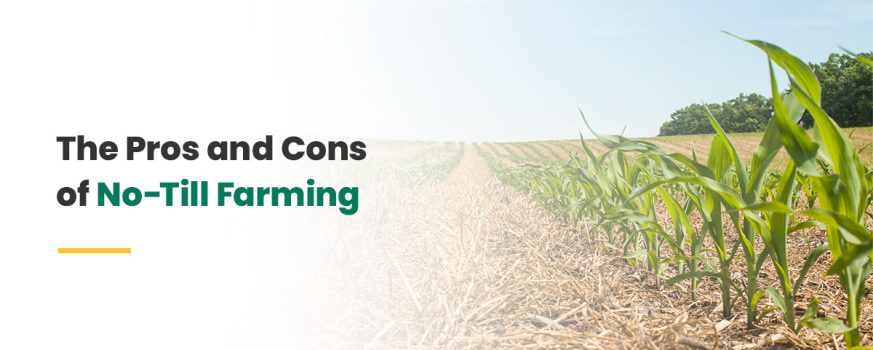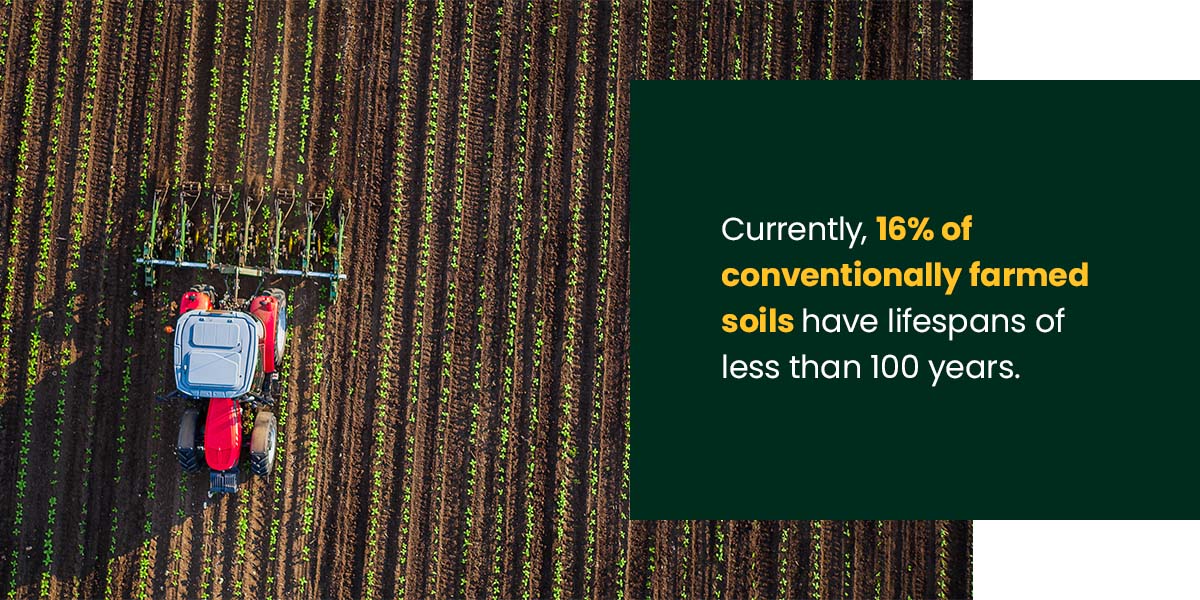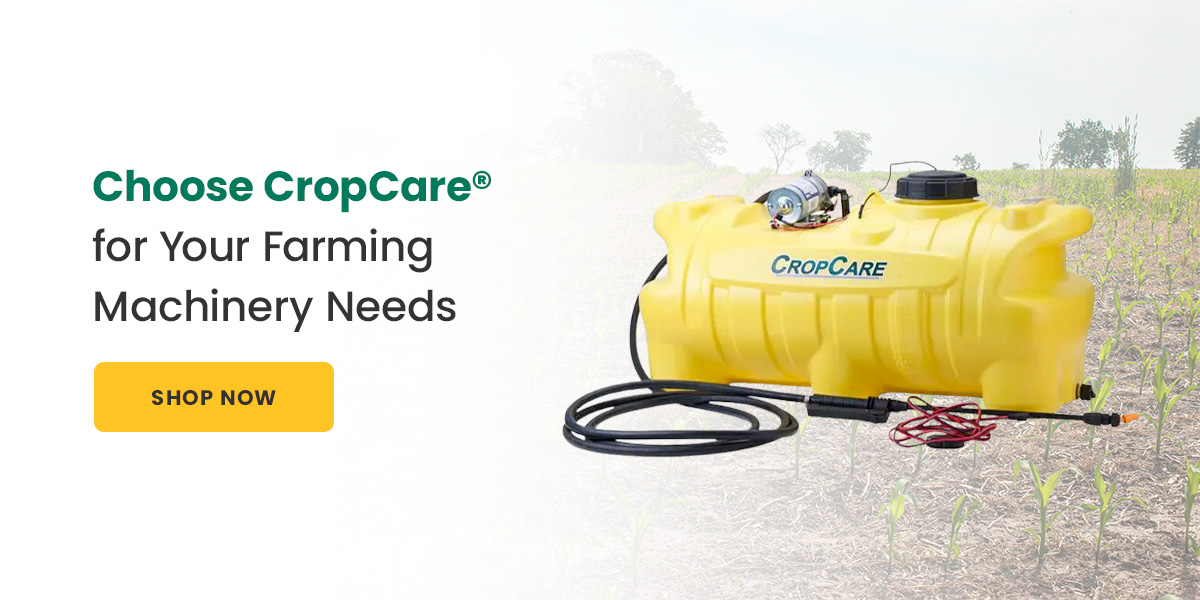
You’re likely familiar with the process of tilling — turning over the top layer of soil to ready the field for new crops. This practice pushes animal manure and weeds deep into the ground and warms and aerates the soil. However, tilling also strips soil and leaves it bare, leaving the soil less able to absorb nutrients and more prone to erosion.
While plowing is still a popular farming method, many farmers are turning to no-till practices rather than those involving conventional tillage. Follow along as we dive into what no-till farming is and why it benefits your field.
What Is No-Till Farming?
No-till farming is an alternative to conventionally tilling a field using a plow. Rather than overturning the topsoil before planting, farmers leave any crop, weed or animal residue on the surface. This method lets you limit disturbance to the soil by creating a path in your field just wide enough to fit seeds. No-till farming helps soil retain its healthiest qualities by keeping soil disturbance to a minimum.
Conventional no-till farming can involve using herbicides to kill cover crops both before and after sowing seeds. This practice has led to a misconception that no-till farming requires farmers to use genetically engineered (GMO) crops. However, if you want to keep your crops organic, you can use other methods:
- Crop rotation: Crop rotation involves planting different crops in the same field on a seasonal basis. Since different crops offer various benefits to the soil, crop rotation helps improve soil health. It also naturally breaks the cycles of weeds and other pests and prevents soil erosion.
- Suppressing weeds: You can cover the inter-rows in your field with straw, hay or mulch to suppress weeds.
- Free-range livestock: Livestock grazing can also help increase soil health, making it an effective part of an organic no-till farming strategy.
Some herbicides can have negative impacts on the environment and human health. If you want to handle weeds without mechanical assistance, consider using organic herbicides in your field.
The No-Till Farming Process
Although plowing started as a way to plant more seeds faster, a no-till process might actually save you more time.
When you plow your field, you need to pass over the area twice — once to till and once to plant. Modern no-till machines remove that first step, so you only need to make a single pass. The no-till process generally involves using special equipment like disc seeders to create furrows in the soil and plant, firm and cover seeds in one go.
When you undertake a no-till farming process, you’ll also need to:
- Prepare the field for spring by evenly spreading residue from the fall harvest.
- Plant “cover crops” during the cool season to hold soil in place.
- Use a no-till planter and a sprayer to care for your crops.
You might want to consider no-till farming if you want to see an increase in your soil quality and harvest output or if you’re interested in making your field more environmentally friendly.
Remember, you’ll have to be patient if you start using a no-till farming method. If you’ve used tilling methods for many years, its adverse effects will take time to reverse. However, the long-term benefits of no-till farming will be worth it!
Benefits of No-Till Farming
In addition to strengthening your soil, no-till farming can save you money on diesel fuel during the planting season. Consider these additional benefits of no-till farming to see the other ways a no-till process can positively impact your field and harvest:
Protects Soil and Reduces Erosion
Currently, 16% of conventionally farmed soils have lifespans of less than 100 years. Tilling soil leaves it bare, prone to erosion by water or wind. No-till farming allows the soil to keep its complex structure, helping the soil absorb water rather than letting the water wash soil away.
Lower erosion rates make no-till farming an extremely attractive option for farmers. Soil is an essential part of growing food, and taking steps now helps ensure it will be present for generations to come.
No-till farming might also be advantageous if you live in an area that doesn’t receive much rain since your soil will better absorb the water it does receive.
Produces Better Quality Soil
Soil structure gets worn down with conventional tillage. No-till keeps nutrients in the soil where they belong and nutrient-rich soil often produces better harvest results.
Saves Insects and Microorganisms
In addition to contributing to the world’s biodiversity, soil’s microorganisms and insect life have numerous benefits for crops. Diverse microbial life strengthens soil and makes it more resilient.
Tilling destroys fungi and bacteria that would otherwise build communities in the soil and feed on its organic matter. Leaving the soil undisturbed lets the living things within it restore the nutrient levels that crops need to thrive.
Helps Fight the Climate Crisis
Exposing carbon to air increases its odds of forming carbon dioxide, adding to the greenhouse gas emissions contributing to climate change. Soil holds carbon, and plowing breaks up aggregates keeping it contained, letting the carbon rise to the surface and meet the air. However, no-till farming doesn’t disrupt soil nearly as much, keeping the carbon in the ground.
Cons of No-Till Farming
Despite the many benefits of no-till farming, there are still some drawbacks you’ll want to consider:
- The use of herbicides might harm the environment and human health.
- No-till farming sometimes requires special equipment, which can become expensive.
- You may risk crop diseases carrying over when the crop residue is not incorporated back into the soil.
However, you can counteract some of these risks with the right strategy. For example, you can avoid spreading diseases by rotating your crops every season and planting new crops that are resistant to the previous crops’ diseases.
Choose CropCare® for Your Farming Machinery Needs
At CropCare®, we want to fulfill your expectations for a good crop yield. Farmers have trusted our experience for over 70 years and we strive to provide the best quality farming equipment for your planting and harvesting methods. Our equipment is built to last and can serve your field needs.
Shop our line of farm and lawn sprayers to get started on your no-till farming journey today. Questions? Fill out our contact form and let us know how we can help you!



